When you were a kid, did you play Duck, Duck, Goose? And as you hit another kid on the head (c’mon, you know you didn’t “tap” anyone), did you tag the little boy or girl you actually had a crush on? Anyone who has been through elementary school knows that if a boy or girl pushes, hits, or shoves you, it may be a sign that they like you. Or they’re just a brat. It could be both. But if it was the former, then you had to figure out how to reciprocate without ending up being stood in a corner or sent to the principal’s office.
Back then, it was all about those little Valentine’s Day cards, or other notes that told that special someone to “Be Mine”. As adults, hopefully the pushing and shoving has stopped, but the question of how to show your affection is still a quandary for many of us. Chocolate? Flowers? Champagne? Ah-ha! Food!!
As holidays like Valentine’s Day roll toward us, everyone is trying to figure out if a) they want to make a reservation for a fab dinner at some fancy restaurant, or b) trying a nice, stay-at-home dinner is the way to go. May I make an argument to stay in, avoid the absurdity of “special” menus and long waits, and have a relaxing, romantic, leisurely dinner at home? And may I also suggest this fantastic duck dish?
If you either “don’t like duck”, or think it’s too fancy to make on your own, I’d like to argue 2 points (I like to argue, so any excuse for it works for me!):
1. If you think you “don’t like duck”, but you eat chicken, you’ve either had duck that was cooked until so tough and dry that the experience scarred you for life. Or you’ve had duck that wasn’t fresh or wasn’t prepped properly.
2. This particular duck recipe is so simple, I argue that it’s easier than chicken. Easier? Yes! Why? Because chicken absolutely MUST be cooked all the way through, and it’s tough to judge if you’re not used to cooking it. With duck, it’s OK if it’s served medium. In fact, it’s preferable for best flavor and texture. Really. I’m serious.
And an additional bonus is that duck is one of the easier meats to pair with wine (in my opinion, anyway). A Pinot Noir is going to hold up really well against the richness of the duck flavor, but still add a hint of berries and fruit that are a great compliment to the citrus in the herb sauce. And you’ll look super smart telling your date about why it’s a good pairing. Impressive.
So pick up a couple duck breasts, heat up the cast iron pan, and get cookin’ for a fancy, impress-your-date, delicious meal. Duck, duck, dinner is served.
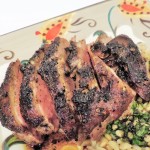
| Servings | Prep Time |
| 2 people | 15 minutes |
| Cook Time | Passive Time |
| 15 minutes | 2-4 hours |
|
|

|
If you can cook chicken, you can pan roast a duck breast--and likely enjoy the outcome even more than the usual "white meat". So simple, so elegant, and so darned good that you'll be looking for excuses to serve this "fancy" recipe.
|
- 2 breasts duck
- 3 cloves garlic minced and divided
- 1 tsp salt divided
- 1 tsp pepper divided
- 1/4 cup Italian parsley chopped
- 1 lemon zested and juiced
- 1/4 cup extra virgin olive oil
- Dry duck breasts with a paper towel to remove any extra moisture. Cut crisscross pattern in the skin side of the meat.
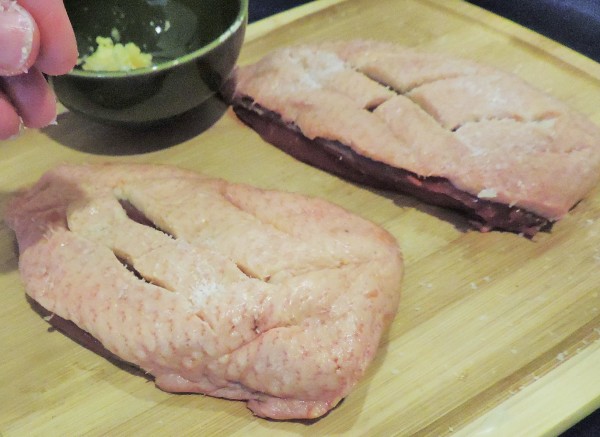
- Mince 2 cloves of garlic, and add 1/2 tsp salt and 1/2 tsp pepper to create garlic paste. Smear garlic paste all over skin side of duck, making sure to get the garlic into the cuts on the skin. Refrigerate for 2-4 hours.
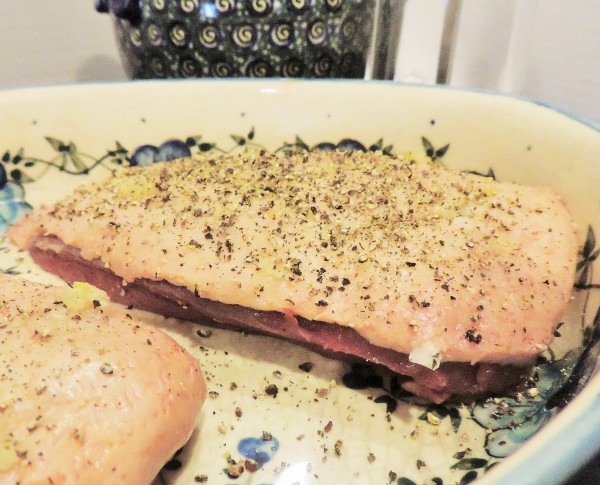
- Remove duck from refrigerator and allow to come to room temperature, about 20 minutes. Preheat heavy iron skillet over high heat. Once skillet is blazing hot (you should not be able to hold your hand over the skillet for more than 3 seconds), place duck, skin side down, into pan. Be sure to have a splatter guard ready as there will be a lot of fat from the duck skin and it will surely splatter. (see recipe note below for alternative cooking method)
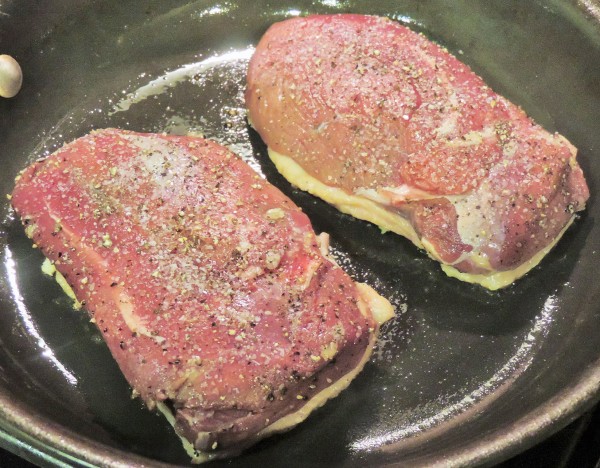
- Sear duck breasts for 6-8 minutes on skin side, and then turn and sear for 4 additional minutes, or until the duck is cooked through. Use an instant read thermometer and pull it off of the heat when it reaches 130-135 degrees. Remove from pan and allow to rest for 10 minutes to allow juices to resettle into the duck.
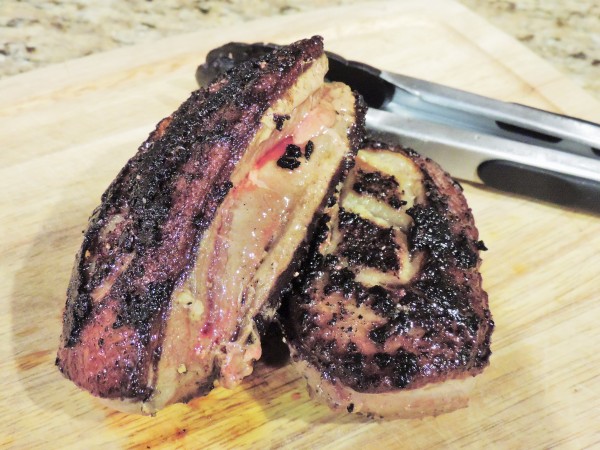
- While the duck rests, make the gremolata. Zest the lemon, and add additional clove of minced garlic, final 1/2 tsp of salt and 1/2 tsp of pepper.
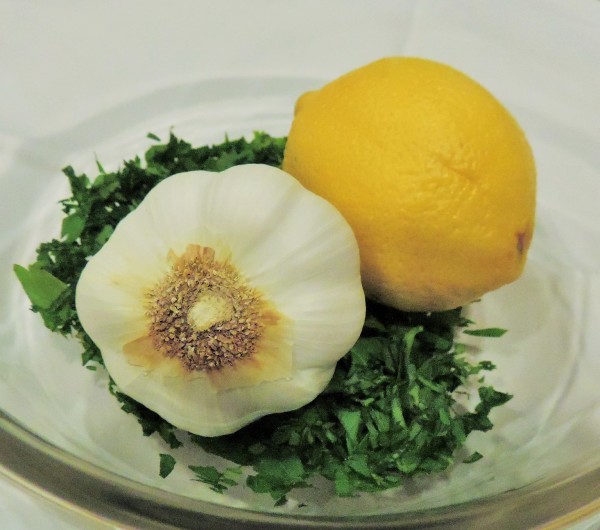
- Add finely chopped parsley and half of juice from the lemon, about 2 tbsp. Slowly drizzle in the olive oil and whisk with a fork.
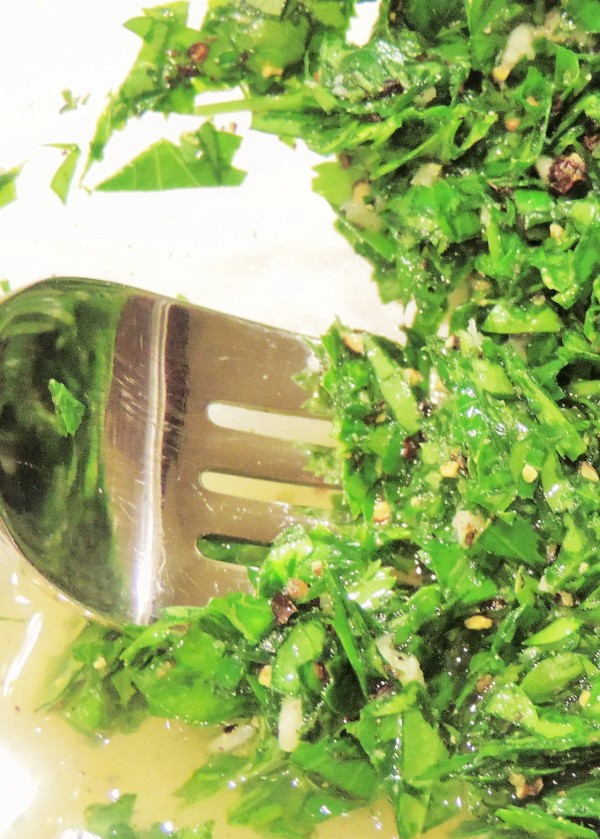
- Serve gremolata over the duck and orzo, or any other grain of your choice. Be sure to get those pan juices on the plate, too--there is a lot of flavor in there, too!
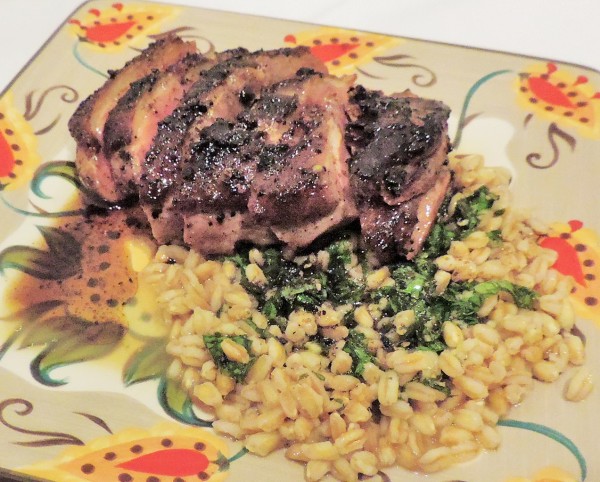
Recipe Notes:
1. Gremolata is a fancy word for a mixture of citrus, herbs and garlic. There are many variations, but the one used here is closer to the classic recipe seen in many restaurants. It's super simple, and can be used as a salad dressing or as a flavor punch to nearly any protein. Never zested a lemon? So simple. Get yourself one of these little kitchen helpers, and you'll be zesting every citrus fruit that comes through your kitchen.
2. If you want to be very fancy schmancy, there is an argument to start with an unheated skillet, and allow the duck to come up to full temp slowly. This allows the fat from the skin to "render", and provides a different way to get a crispy skin on the duck. The rendered fat can be kept in the fridge for quite a long time, and is AWESOME when frying other items like french fries or other starches. People pay big bucks for duck fat, so making your own is a much smarter move if you're able to do it!
3. I know that if you read the recipe, you are probably freaking out when I talked about the internal temp for the duck. Don't panic! Duck is meant to be served medium to medium rare. No, really. Anything beyond that and it becomes a dry, tasteless, stringy bird. If you can't take it with the duck at that temp, go ahead and cook it closer to medium well (if you just HAVE to), but I promise you will be OK--and become a convert.
Served with any hearty grain and a mixed green salad, this dish really does impress. I used orzo because it's what I had on hand, and it worked really well.
**This recipe is out of a recent magazine (although I cannot for the life of me remember which one it was!). I promise to post a link once I find the darned thing!**

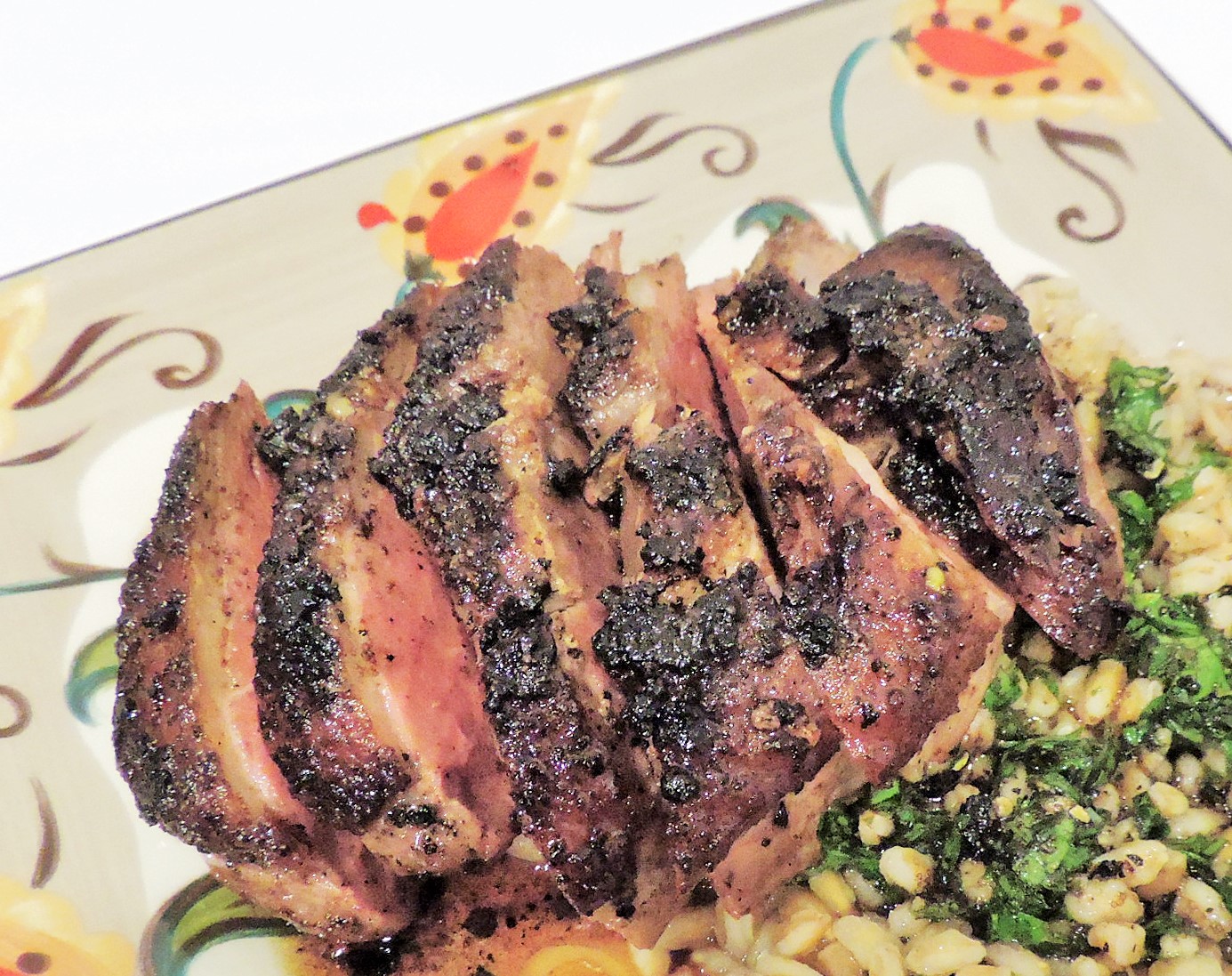
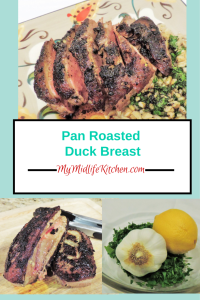






I’ve never cooked with duck. This does look very delicious and very fancy. The gremolata sounds delish!
I adore duck, it’s my favorite meat. I agree that it’s so simple to prepare! Most people think it’s intimidating and hard but that’s so not the case.
I’ve never made duck breast at home before, but this sounds really straightforward and easy. Gonna have to give it a try!
Oh my gosh, I can almost taste this – it looks brilliant. I adore duck, and have a duck for two recipe planned for Valentine’s day already! This is a delicious flavor profile, I bet that gremolata is perfect with the duck. Yum!
The gremolata goes with so many things, which is one of the reasons I love this recipe! :o)
What a beautiful recipe for Valentine’s Day. Duck is one of those special occasion meals that we often have at my inlaw’s house. Your step by step directions make it look easy enough for me to try.
I’ve never made duck, but recently saw a thread on our neighborhood list serv about where to get fresh duck. (A local butcher seems to be the best source.) This recipe looks so easy – and your step-by-step directions are so good, that I’m tempted to try it.
It really is so darned simple, and such an impressive dish for company or just for me! Having a local source for the duck is wonderful! Lucky you!
I LOVE duck! Can’t wait to try this, my family will devour it. Thanks!